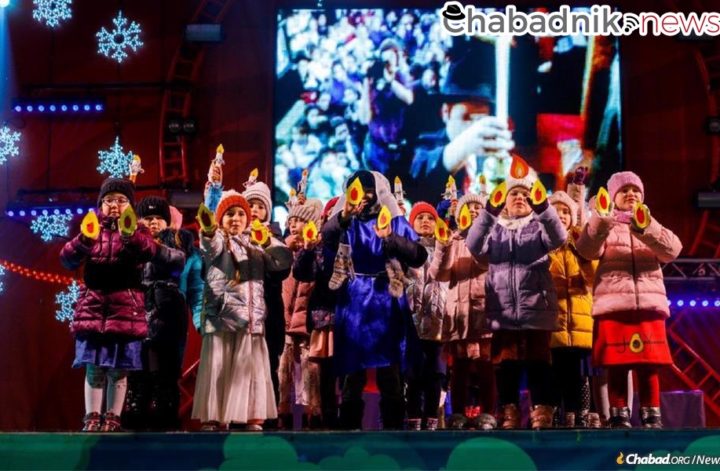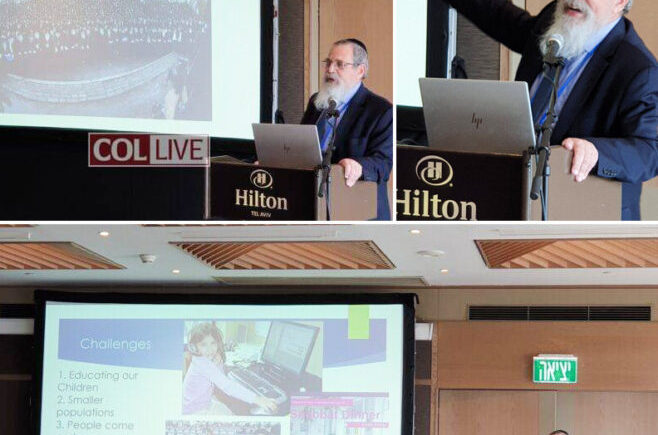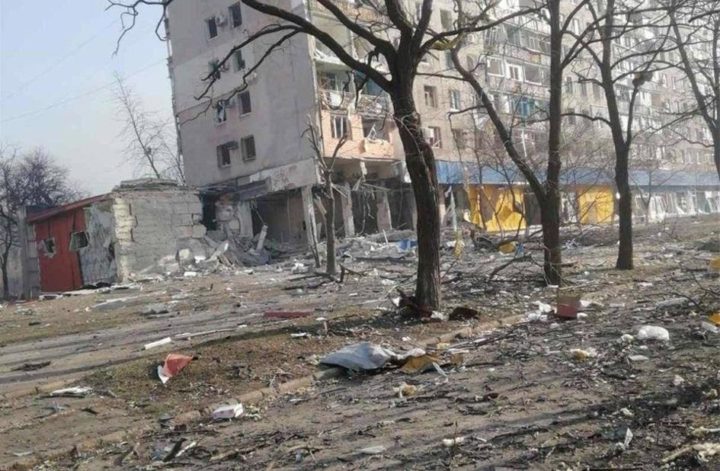Wide-ranging care and support from campus Chabad and college administration
A year after the deadliest attack on the Jewish community in U.S. history—the slaughter of 11 Jewish worshippers and injury of six more during Shabbat prayers at the Tree of Life congregation in Pittsburgh—college students talked about the uplifting influences provided by Chabad House on Campus-Pittsburgh and the university community at large that have helped them cope in the aftermath of the immense tragedy.
Gabi Kaufman, a recent student president of Chabad at the University of Pittsburgh, shared with Chabad.org the bewilderment he experienced upon witnessing a parade of police cars with sirens blaring, whizzing by as he walked to his own place of worship on Shabbat morning, Oct. 27, 2018. Upon arrival, police were ushering worshippers, including him, into the synagogue that is part of the Yeshiva Schools of Pittsburgh Torah learning institution.
“They waived me into the shul, and then it went into lockdown,” Kaufman, 23, recalled about what at that point remained a mystery to him as to the full nature of the tragedy. “Rabbi [Yisroel] Rosenfeld was just before the reading of the weekly Torah portion, and stopped and asked the congregation to say a few chapters of Tehillim [Psalms].”
Rosenfeld would later note that the Rebbe—Rabbi Menachem M. Schneerson, of righteous memory—“would remind us to say in difficult times, Barcheinu Avinu kulanu k’echod [‘Bless us our Father, all of us as one’]. We must unite to do what we can for everyone.”
It wasn’t until the walk back to the University of Pittsburgh campus Chabad center with its co-director, Rabbi Shmuli Rothstein, that the full details of the mass shooting began to emerge as the two came upon Jews and non-Jews alike with tears in their eyes and the worst news on their lips.
Then, without much delay, a turnaround started, said Kaufman—a shift from anguish and pain to relief and comfort. It was prompted by an outpouring of unity, courage and strength by his fellow students, led by the Chabad rabbis and their wives, with additional support from a devoted school administration.
“When we got to the rabbi’s house, there were 50 to 60 students there for Shabbat lunch,” Kaufman remembered, indicating the numbers represented a six-fold leap from the usual “more intimate” attendance.
Kaufman, a finance and marketing graduate who has gone on to study at Chabad’s Mayanot Institute of Jewish Studies in Jerusalem, said the phenomenon then kept repeating itself.

‘Incredible Acts of Unity’
“Greater than the sorrow that ensued in the aftermath of the attack were the incredible acts of unity,” he said. “The night after the shooting, upon completion of Shabbat, we had about 100 people come out for Havdalah [candlelight service that officially ends Shabbat]. The next morning, many people came to an emergency Shacharit [morning prayer service]. Then, the next week, 600 students showed up for a Shabbat meal, which was completely unprecedented.”
The care individual faculty members showed was also exceptional, he said.
“During the upcoming week, I was sitting in a public relations management class and the teacher asked me to share what Shabbat means to the Jewish community as tears were welling up in her eyes.”
The support only increased, along with heightened camaraderie throughout the year, he said.
This past Saturday night after Shabbat, another memorial Havdalah ceremony was held, marking a year since the incident and celebrating the 31st year of Chabad House on Campus in Pittsburgh. The gala affair was designed to continue to boost student morale and honor the school’s chancellor, Patrick Gallagher, who galvanized the university’s counseling staff beginning on the day of the tragedy to provide services to traumatized students and others at the Chabad center.
“We never welcome tragedy, but what has come out of this tragedy is a beautiful and heartfelt and growing response of caring and support,” said Sara Weinstein, co-founder with her husband, Rabbi Shmuel Weinstein, of the Chabad House on Campus chapters in Pittsburgh. “We chose the chancellor to honor because he mobilized the administration to come to the aid of the students. They provided counseling on the day of the shootings, for the following week and beyond.”

A Partnership Among Campuses
Since their arrival in Pittsburgh in 1988, the Weinsteins have built a Chabad presence on several campuses. They include the University of Pittsburgh with Rabbi Rothstein and his wife, Chasi, catering to the needs of undergraduates, and Rabbi Shua and Shoshana Hoexter, who serve graduate students. Chabad of Carnegie Mellon University is run by Rabbi Shlomo and Chani Silverman. “Seven campuses in all,” Weinstein said, “in a partnership that has made a big difference for all of the students.”
Weinstein told of how a year ago at the Havdalah ceremony that took place after nightfall the day of the slayings, University of Pittsburgh’s Senior Vice Chancellor Kathy Humphrey stirred the crowd with the words: “Today would be a good day to lose hope, but we cannot. For if we lose hope, they win.” At Saturday night’s event, she said Rabbi Rothstein reminded the audience of Humphrey’s words and added, “We have not lost hope, and we have won!”
Regarding the legal case, federal prosecutors have announced that they plan to seek the death penalty against the suspected shooter, 47-year-old Robert Bowers. In a notice to seek capital punishment, the U.S. Justice Department has cited how Bowers’s anti-Semitic views played a role in the shooting, the intentional nature of the shooting and the fact that he showed no remorse afterwards. In the incident, 11 Jewish men and women were killed, and six injured, including four police officers who responded to the shooting after Bowers entered the synagogue in Pittsburgh’s Squirrel Hill neighborhood, shooting and screaming anti-Semitic epithets.
A year after the massacre, University of Pittsburgh senior Zahava Rubin is still reeling from the terror. But like fellow student Gabi Kaufman, she has been bolstered by the support of the community, fellow students, and the rabbis and their wives who have “provided the students with dozens upon dozens of opportunities and services to express their grief and seek comfort,” she said.

Dressed in a T-shirt handed out to students by the school in the aftermath of the tragedy, emblazoned with the words: “Stronger Than Hate” and a Star of David, Rubin was preparing to attend a one-year, community-wide anniversary memorial service, scheduled for Sunday evening on the massive lawn outside Pittsburgh’s Soldiers and Sailors Memorial Hall and Museum.
“My roommate and I are among a relatively small group of practicing Jews at the university,” said Rubin of Philadelphia, who was student president of the school’s Chabad center after Kaufman and at the time of the shooting. “I am dedicated to this fight.”
At a vigil organized by the university administration on the Monday after the shooting, attended by as many as 4,000 of her fellow students and professors from all walks of life, Rubin said she was afraid to stand up and talk at first, though forced herself to do so.
“I felt a social obligation to say anything I could to help them through this difficult time,” she said, sharing that she told the crowd: “This is the most important time to stay together. We don’t have time to be sad. We have to unite and make sure everyone in the world knows the Jewish community will continue to stay strong and fight against anti-Semitism.”



